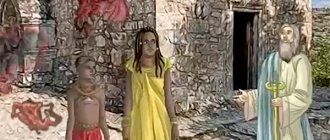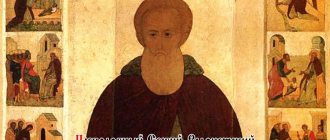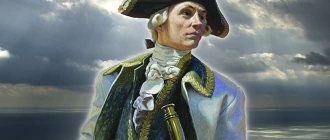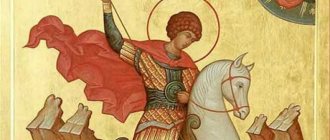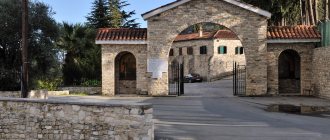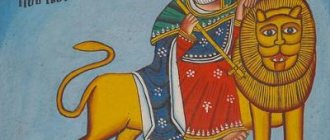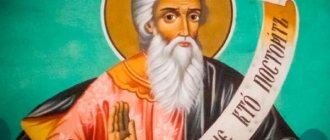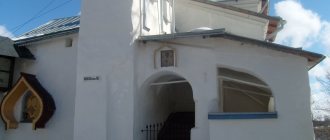"Save me, God!".
Thank you for visiting our website, before you start studying the information, please subscribe to our Orthodox community on Instagram, Lord, Save and Preserve † - https://www.instagram.com/spasi.gospodi/. The community has more than 60,000 subscribers. There are many of us like-minded people and we are growing quickly, we post prayers, sayings of saints, prayer requests, and timely post useful information about holidays and Orthodox events... Subscribe. Guardian Angel to you!
Today, when medicine is powerless in treating many diseases, more and more people go to church with faith in healing. After all, it is in church that you can find peace for your soul, pray in silence, confess and, bowing to the holy image, be healed of many illnesses and ailments. Among all the images, the image of Metropolitan Dmitry of Rostov occupies a special place. Parishioners from all over the world come to him and ask for healing from many ailments. These are mainly ailments such as diseases of the cardiovascular system, blindness, headaches and much more.
early life
Saint Demetrius of Rostov (name in Baptism - Daniel) was born in the town of Makaryev (located near the city of Kyiv), in the family of the military centurion Tuptala Savva Grigorievich, in December 1651.
Daniel's parents were distinguished by their firmness of faith and piety. From an early age, they instilled in their son respect for God's law, devotion to the Church and the Fatherland.
Due to his father’s frequent absences related to military duty, his mother played the main role in Daniel’s upbringing. Subsequently, he repeatedly recalled her as a virtuous daughter of the Church.
Wanting to give their son a decent education, his parents enrolled him in the Kiev Fraternal School (founded through the efforts of Metropolitan Peter Mogila, this school was famous throughout the area; subsequently, the Theological Academy was formed on its basis).
During the learning process, Daniil showed extraordinary abilities. Thanks to his innate abilities, diligence, and determination, he more than once became an object of admiration from teachers and administration. In the process of completing the educational course, he mastered several languages (Greek, Latin, Polish, Hebrew), mastered the rules of rhetoric and poetics, and became imbued with the teachings of the God-bearing fathers.
Along with theoretical disciplines, Daniel sought to absorb and assimilate practical skills of life in Christ. He preferred a quiet and silent stay in church, reading edifying literature, and mental prayer to noisy companies and pleasure walks with his peers.
When in 1665 the Polish conquerors, having captured Kiev, set fire to the Brotherhood monastery and school, Daniel was forced to return to his parental home. When he returned, he did not abandon his studies, but with even greater spiritual impulse he devoted himself to self-education.
During this period, he regularly participated in temple services, studied the Books of Scripture, and listened to the instructions of the shepherds. Gradually, with the assistance of God, he turned his heart towards monasticism.
Third prayer to St. Demetrius of Rostov
O all-blessed Saint Demetrius, great saint of Christ, Chrysostom of Russia, hear us sinners praying to you, and bring our prayer to the Merciful and Lover of Mankind, to whom you now stand in the joy of the saints and with the faces of the Angels!
Pray to His mercy, that He not judge us according to our iniquities, but that He deal with us according to His mercy. Ask us from Christ and our God for a peaceful and serene life, mental and physical health, earthly prosperity and all abundance and prosperity in everything, and may we not turn the good things given to us from the Generous God into evil, but into His glory and the glorification of your intercession .
Grant us to pass through the field of temporary life in a God-pleasing manner; deliver us from airy ordeals and guide us on the path that leads to the villages of the righteous, where they celebrate the unceasing voice, beholding the indescribable kindness of God’s face. Preserve the Holy Church from schisms and heresies, strengthen the faithful, convert the erring, and grant to all everything that is appropriate for the salvation and glory of God; Save your fatherland from enemies without harm, but overcome the weapons of the Crusader army; and grant us all your archpastoral and holy blessing, so that we will be overshadowed by it, get rid of the wiles of the evil one and escape from all troubles and misfortunes. Hear our prayer, Father Demetrius, and constantly pray for us to the Almighty God, glorified and worshiped in the Three Hypostases, to Him belongs all glory, honor and power forever and ever. Amen.
↑up
Priestly ministry
By becoming like the angelic service both as a monk and as a deacon, Demetrius gained even greater love among the brethren.
In 1675, Archbishop Lazar (Baranovich) elevated him to the rank of hieromonk. Realizing the personal merits and spiritual gifts of Father Demetrius, the archbishop called him to himself and assigned him to preach at his pulpit.
The ardor of the young priest's sermons, the clarity and accessibility of his exhortations revealed in him a very zealous and educated shepherd, sensitive and close to people. Soon they started talking about him in both Ukraine and Lithuania.
Instructing his neighbors in matters of moral improvement, Father Dimitri was no less attentive to himself.
In 1667, he received an unusual dream, through which God reminded him of the need for more strict fulfillment of his monastic and priestly duties. He remembered this dream for the rest of his life.
When Father Dimitri, wanting to venerate the miraculous image of the Mother of God, visited, with the blessing of his superiors, the Novodvorskaya monastery (located within the Lithuanian borders), the Belarusian Bishop Theodosius invited him to go to Slutsk and asked him to preach at the Fraternal Transfiguration monastery.
Father Dimitri agreed. He spent more than a year in the Brotherly Monastery. After the death of Bishop Theodosius, he was forced to return to Ukraine.
With the intervention of Hetman Samoilovich, he settled in the Krutitsky Nikolaev monastery. Some surrounding monasteries offered him the position of abbot, but he avoided this post in every possible way: firstly, out of humility, and secondly, the hetman held him back.
Saint Dimitri Metropolitan of Rostov: miracles and healings
A little more than 40 years after the death of the Metropolitan of Rostov, the floor sank above his grave. While repairing this floor, workers uncovered the log frame of Dmitry's grave. Thus, incorruptible relics were discovered. After examining the relics and numerous healings at Dmitry’s tomb, the church canonized him in 1757.
Since then, believers have come to his relics with requests:
- About the intercession of the orphan and widow;
- Help for poor people in need;
- About healing from pulmonary disease.
The relics also help to heal from many diseases of the cardiovascular system and respiratory tract diseases. By the way, the cause of the Metropolitan’s death was “chest illness.”
Soon the fame of the healings spread throughout the world, now pilgrims from all over the world come to them and the sick, blind, and dumb pray. Everyone is healed through prayers performed at the holy relics.
The best article for you, go to: St. Tikhon Patriarch of Moscow
It is worth noting that since 1991, the relics of St. Demetrius of Rostov were transferred to the Yakovlevsky Church, which is located on the territory of the Spaso-Yakovlevsky Monastery.
In addition, on the territory of the Russian Federation there are several churches of Metropolitan Demetrius of Rostov. Having visited which you can also ask the saint for healing from many diseases and illnesses. Churches are located in such areas as: Ivanovo, Moscow, Kurgan, Tula, Belgorod, Yaroslavl and others.
The date of commemoration of the saint is the date of his death. Namely September 21st. It is on this day that a huge line of ministers and pilgrims stands at his relics, praying for their healing.
Prayer to St. Dmitry of Rostov
O wonderful and glorious wonderworker Demetrius, healer of human ailments! You constantly pray to the Lord our God for all sinners: I pray to you, be my intercessor before the Lord and my helper to overcome the insatiable passions of my flesh and to overcome the arrows of my opponent the devil, who hurts my weak heart and, like a smooth and fierce beast, hungers to destroy my soul.
You, Saint of Christ, are my fence, you are my intercession and weapon! With your help, I will crush everything in me that resists the will of the King of kings. You, the great miracle worker, during the days of your exploits in this world, zealous for the Orthodox Church of God, like a true and good shepherd, you kindly exposed the sins and ignorance of people, and you guided those who strayed from the path of truth into heresies and schisms on the path of truth.
Make it easy for me to correct the short-lived path of my life, so that I may unfalteringly follow the path of God’s commandments and work unslothfully for my Lord Jesus Christ, as my only Master, Redeemer and my righteous Judge. Falling down to this, I pray to you, servant of God, when you remove my soul from my body, deliver me from dark ordeals: I have no good deeds to justify my justification: do not let Satan become proud of the victory over my weak soul. Deliver me from Gehenna, where there is weeping and gnashing of teeth, and through your holy prayers make me a partaker of the Heavenly Kingdom in the Trinity of the glorified God, the Father and the Son and the Holy Spirit. Amen.
God bless you!
The best article for you, go to: Venerable Benedict of Nursia
Hegumen ministry
In 1681, Hieromonk Dimitry went with a message from the hetman to Archbishop Lazar Baranovich. The latter, having met the messenger, gave him a warm welcome. Taking into account the personal petition of the hetman and taking into account the desire of the brethren of the Maksakov monastery (Chernigov province), the archbishop elevated Hieromonk Dimiry to the rank of abbot of this monastery.
The next year, at the insistence of the hetman, with the blessing of Bishop Lazar, Father Dimitri left the Maksakov monastery and headed the Baturin Krutitsa monastery. He ruled this monastery for one year and eight months, but then, seeking prayerful solitude, he abandoned leadership and retired.
Some time later, Archimandrite Varlaam, rector of the Kiev-Pechersk monastery, invited Father Demetrius to the Lavra, so that he would carry out a responsible task that he had long planned: compiling the Lives of the Saints.
In 1684, Father Dimitri, accepting the invitation, took up this work.
In 1685, he received two Revelations, in which he was told that the saints favored his work. This reinforced and inspired him to continue his work.
In 1686, with the blessing of Metropolitan Gideon, Father Dimitri headed the Baturinsky Nikolaevsky Monastery. While managing the affairs of the monastery, he continued to write Lives. Soon the first part of the work was published.
After some time, in order not to be distracted from writing, he moved from the abbot’s chambers to a modest cell, and then, abandoning the leadership of the brethren, he moved to Kyiv.
Here the Chernigov Archbishop Theodosius found him and, due to personal considerations, elevated him to the rank of archimandrite and put him in charge of the Peter and Paul Monastery (located near the city of Glukhov).
Soon, by order of Metropolitan Varlaam, Father Dimitri was transferred to the Kyiv Trinity-Cyril Monastery, but he did not remain here for long.
After five months, he was ordained archimandrite and appointed rector of the Yeletsky Chernigov monastery. In addition, the Glukhov Monastery came under his leadership.
More than two years later, a new assignment followed: to Novgorod, to the Seversk monastery of the All-Merciful Savior.
Holy ministry
In 1700, Tsar Peter I turned to the Kyiv Metropolitan with the desire to find a man of righteous life, capable of becoming an educator of the pagans, for the Siberian See. After the choice fell on Archimandrite Dimitri, he was summoned to Moscow, where he met with the sovereign.
In 1701, a month and a half after his arrival, Saint Demetrius was consecrated Metropolitan of Tobolsk and Irkutsk.
The saint could not immediately go to his pulpit. As a result of endless wanderings, his health was undermined. In addition, realizing that in distant Siberia he would hardly be able to finish compiling the Lives, he fell into deep sorrow and then fell ill. Having learned about what had happened, the autocrat honored Saint Demetrius with a visit and ordered not to leave Moscow, but to wait for a place in one of the closer dioceses.
The stay in Moscow lasted about a year. During this time, the saint gained the respect of a number of influential people and became familiar with the essence of government reforms.
By this time, Metropolitan Joasaph of Rostov had died, and Bishop Dimitri was installed in the orphaned see. The Siberian department was headed by Bishop Philofey Leshchinsky.
In March 1702, Saint Demetrius arrived in Rostov and settled in the Yakovlev monastery. In the monastery church he designated the place for his future burial.
Getting acquainted with the state of affairs, he soon discovered that among the local clergy there were many irresponsible, ignorant clergy. The saint devoted a lot of time and effort to normalizing this situation.
In order to improve the training of future priests, he organized a school at his own expense. This school was located near his chambers. It included three educational classes. The Bishop vigilantly monitored how the educational process was carried out. At the same time, he monitored the moral education of his students: he demanded that they regularly attend temple services, he himself performed solemn services, and he himself instructed them by word and example.
Along with this, Saint Demetrius worked to overcome schisms and fought against obscurantism and popular superstitions.
Despite the workload of managing the department, during this period he finished writing the Lives of the Saints.
In 1705, Dimitri Rostovsky left for Moscow on call. During this period, his main activity was education, preaching, and the fight against sectarian movements.
In 1707 he returned to the diocese. By this time, his health had deteriorated significantly, but he did not withdraw from his pastoral duties and continued to engage in the field of literary creativity.
Three days before his death, Demetrius of Rostov served a service dedicated to the memory of Saint Demetrius of Thessaloniki, but he no longer had enough strength to preach. Subsequently, he was in a state of severe physical exhaustion.
Just before his death, singers visited him and performed the spiritual chants he composed. Then he let them go and closed. The next morning, October 28, 1709, he was found kneeling in a prayer position, but already lifeless.
When is the feast day of St. Demetrius of Rostov in 2022?
There are two days of remembrance of St. Demetrius, Metropolitan of Rostov in 2022.
- October 4
is the day of the discovery of the relics of St. Demetrius, Metropolitan of Rostov. - November 10
is the day of memory of Dmitry of Rostov.
According to the old style, the day of memory of Demetrius of Rostov was celebrated on the church calendar on October 28, the discovery of the relics of Demetrius of Rostov according to the church calendar (old style) was on September 21. The dates are not moving; they are celebrated by the Orthodox Church on the same day every year.
Troparion to the Saints of Rostov, tone 4
Holy Wisdom, / teacher of the enlightenment of God to your flock, / multiplying the faith of the Gospel in people, / exemplifying heavenly love on earth, / the people of the country of Rostov and Yaroslavl, who shared salvation, / serving truly God, / and the worthy companions of the apostles appeared in nature, / Leontius the Hieromartyr, Isa aie , Ignatius, Jacob, Theodore / and the Russian goldsmith Demetrius, / pray to Christ God / for the bishops who are your successors on the throne, / for the people who piously honor you, / for our Orthodox country // and for the entire Church of Christ.
Troparion and Majesty to St. Demetrius of Rostov
Troparion, tone 8
To the zealot of Orthodoxy and the uprooter of schism, Russian healer and new prayer book to God, with your writings you have made them wise, O spiritual priest, Blessed Demetrius, pray to Christ God for the salvation of our souls.
Kontakion, tone 4
The Russian star, which shone from Kiev, and reached Rostov through Novgrad Seversky, and illuminated this whole country with teachings and miracles, let us please the golden-talking teacher Demetrius: for he has written everything for everyone, even for instruction, so that he will gain everyone, like Paul, to Christ and save by orthodoxy our souls.
↑up
Kontakion to the Saints of Rostov, tone 4
Guardian of the New Testament of God with man, / fulfiller of the Gospel commandments, / in good deeds, / holy wisdom, venerable and righteous God-bearing, / the land of Rostov and Yaroslavl / fragrant with prayers, / all things named and unnamed, / revealed and hidden, / coming to the Life-Giving Trinity, / do not depart from us in spirit / and incline Divine mercy to us, / so that with boldness we all bring glory to God in the Highest, / may there be indestructible peace on earth, / and love and goodwill // among all people.
Second prayer to St. Demetrius of Rostov
O Saint Dmitry, great saint of Christ, Chrysostom of Russia! Hear us sinners praying to you, and bring our prayer to God the Lover of Man for the servants of God (names).
Beg His mercy, that He may not condemn us for our iniquities, but may He deal with us according to His mercy. Ask us from Christ our God for a peaceful and serene life, mental and physical health. Grant us a godly way to cross the path of temporary life: deliver us from airy ordeals and guide us on the path leading to the villages of the righteous; Grant us your archpastoral and holy blessing, so that in the autumn we will get rid of the wiles of the evil one and escape from all troubles and misfortunes. Hear our prayer, Father Dmitry, and constantly pray for us to the Almighty God, glorified and worshiped in three Hypostases, to Him belongs all glory, honor and power forever and ever.
↑up
